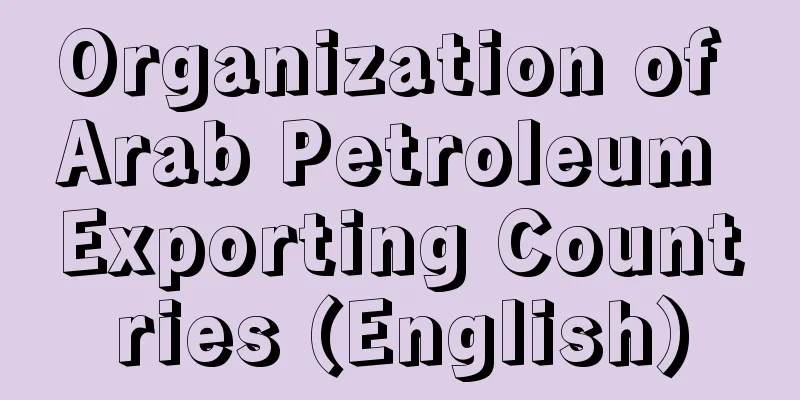Organization of Arab Petroleum Exporting Countries (English)

|
Abbreviated as OAPEC, it was established on January 9, 1968 by Kuwait, Saudi Arabia, and Libya to protect the interests of Arab oil-producing countries. The number of member countries has since increased, and as of 2008 it consists of 11 countries: the United Arab Emirates, Algeria, Iraq, Egypt, Qatar, Kuwait, Saudi Arabia, Syria, Bahrain, Libya, and Tunisia. Its headquarters are in Kuwait, and its main organizations include the General Assembly, Council, and Secretariat. The original purpose of the organization was to be "a sort of European community for the Arab oil-producing countries, to carry out all kinds of joint ventures in oil and other related economic fields." However, the direct motivation for the establishment of OAPEC was the failure of the oil embargo imposed by the Arab oil-producing countries during the Six-Day War between Israel and Egypt in 1967. In other words, during the Six-Day War, the Arab oil-producing countries took the strong measure of banning oil exports to the United States, Britain, and former West Germany, all of which supported Israel. However, the Arab embargo policy failed because non-Arab oil-producing countries such as Iran and Venezuela increased their production and exports to the embargoed countries. Due to this bitter experience, the Arab oil-producing countries formed OAPEC to strengthen their unity and solidarity in oil policy and related economic fields. This meant the self-management of the oil resources of the Arab oil-producing countries. While the Organization of the Petroleum Exporting Countries (OPEC) was formed by the world's major oil-exporting countries with the goal of maintaining and restoring the official price of crude oil, OAPEC seeks to build a broader, common economic foundation and, as Syria and Egypt, which are not oil-exporting countries, later joined, it can be said to be an organization with a strong political coloring. OAPEC has been working on joint ventures since 1970, building a repair dock for 250,000-ton tankers in Bahrain, and also pursuing joint petrochemical ventures and joint ownership of pipelines. However, the Iran-Iraq War in September 1980 brought the two countries into conflict. Furthermore, the Gulf War, which began on August 2, 1990, triggered by Iraq's invasion of Kuwait, effectively weakened the organization. In mid-February 1998, America's distrust of Iraq grew, and the situation again appeared to be on the brink of war, but it was resolved through the mediation of UN Secretary-General Kofi Annan. However, with the outbreak of the Iraq War in 2003 and other conflicts in the Middle East, the organization's international role has declined. From the second half of 2007 to the first half of 2008, crude oil prices in the United States rose, and there was a growing demand for alternative energy sources and consumers were showing signs of saving money, causing crude oil prices to fall again. This is also due to the fact that criticism of oil investors has become tougher. Of course, imports from China, India and other countries have increased, with their import ratio now at the 40% level. The Organization of Arab Petroleum Exporting Countries is also being forced to consider production plans and measures to deal with the excess dollar while keeping an eye on the movements of consumer countries and new demand countries. At the same time, it will likely reconsider its response while assessing the environmental policies of developed and developing countries. [Yoshiharu Shimizu] [References] | | | | |Source: Shogakukan Encyclopedia Nipponica About Encyclopedia Nipponica Information | Legend |
|
略称OAPEC(オアペック)。1968年1月9日にクウェート、サウジアラビア、リビアの3か国によってアラブ産油国の利益を守るために設立された機構。その後加盟国は増加し、2008年現在、アラブ首長国連邦、アルジェリア、イラク、エジプト、カタール、クウェート、サウジアラビア、シリア、バーレーン、リビア、チュニジアの11か国で構成されている。本部はクウェートに置かれ、主要機関として総会、理事会、事務局が設けられている。 当初の設立目的は、「アラブ産油国におけるヨーロッパ共同体のようなものであり、石油およびその他の関係ある経済分野で、あらゆる種類の合弁事業を行う」ことにあった。だがOAPEC設立の直接の動機は、1967年のイスラエルとエジプトの「六日戦争」(第三次中東戦争)の際にアラブ産油国がとった石油禁輸措置の失敗にある。すなわち、六日戦争のとき、アメリカ、イギリス、旧西ドイツがイスラエルを支援したとして、アラブ産油国はこれらの国への石油輸出を禁止するという強硬措置をとったが、イラン、ベネズエラなど非アラブ産油国が増産してアラブが禁輸措置をとった国への輸出を増大したため、アラブの禁輸政策は失敗に帰した。こうした苦い経験から、アラブ産油国は、石油政策ならびにそれに関係する経済分野で団結と統一を強化するためにOAPECを結成したのである。このことは、アラブ産油国の石油資源の自主管理を意味した。石油輸出国機構(OPEC(オペック))が世界の主要な石油輸出国で結成され、その目的を原油の公示価格の維持・回復に置いたのに対して、OAPECはより幅広く、共通の経済的基盤を築こうとするものであり、またのちには石油輸出国ではないシリア、エジプトが加わったことからも、政治的色彩の濃い機構といえよう。 OAPECは、1970年以来共同事業などにも取り組み、バーレーンに25万トン級タンカーの修理用ドックをつくり、さらに石油化学合弁事業、パイプラインの共同所有などを進めていた。だが、1980年9月のイラン・イラク戦争で両国は対立する。さらに1990年8月2日、イラクによるクウェートの侵攻に端を発した湾岸戦争が、この機構を実質上、弱体化させてしまった。1998年2月なかばに、イラクに対するアメリカの不信は高まり、ふたたび戦争寸前の様相を呈したが、国連のアナン事務総長の調停によって治まった。しかし、2003年にはイラク戦争が起こるなど中東地域での紛争が続くなか、この機構の国際的役割は低下している。2007年後半から2008年前半にかけて、アメリカ国内で原油価格が上昇し、代替エネルギーへの要望が強くなったり、消費者の節約傾向がみられ、原油価格はふたたび低下した。これは石油投資家への批判が厳しくなったことにもよる。もちろん中国、インドなどは輸入が増加し、その割合は40%台になった。アラブの石油輸出国機構も、消費国、新需要国の動きをみながら生産計画や過剰ドル対策のあり方を迫られている。同時に、先進国、途上国などの環境政策を見極めつつ、その対応も再検討されるであろう。 [清水嘉治] [参照項目] | | | | |出典 小学館 日本大百科全書(ニッポニカ)日本大百科全書(ニッポニカ)について 情報 | 凡例 |
>>: Arab States Broadcasting Union; ASBU
Recommend
Environmental health - Kankyohoken (English)
A science that clarifies environmental elements th...
Kiyoshi Shiga
Bacteriologist. Born the son of Sato Makoto, a sa...
Mino products
The general term for swords made by swordsmiths in...
Kiyaza
…In the Middle Ages, a group of merchants engaged...
Song form
...a term in musical composition referring to sim...
Reinke, J.
… At the end of the 19th century, Driesch, who wa...
Legend of Mt. Miwa
A divine marriage tale about the god of Mt. Miwa. ...
Kallinos (English spelling)
Greek elegiac poet of the 7th century BCE. Only a ...
Honryōshi - Fisherman
Hon-byakusho in fishing villages. Terms such as Ha...
Washington clam (Uchimurasakigai)
A bivalve mollusc of the Veneridae family with a d...
Laurencia grevilleana (English spelling) Laurencia grevilleana
…[Mitsuo Chihara]. . . *Some of the terminology t...
Clodius, P. (English spelling) ClodiusP
…The first corn bill was presented in 123 BC by G...
Teiichi Hijikata
Art historian and art critic. Born in Ogaki, Gifu...
Taxus
…An evergreen conifer of the Taxaceae family that...
Seasonal Festival
…Of these festivals, the most historically ancien...







![Apres [river] - Apres](/upload/images/67cf37c0918a1.webp)

